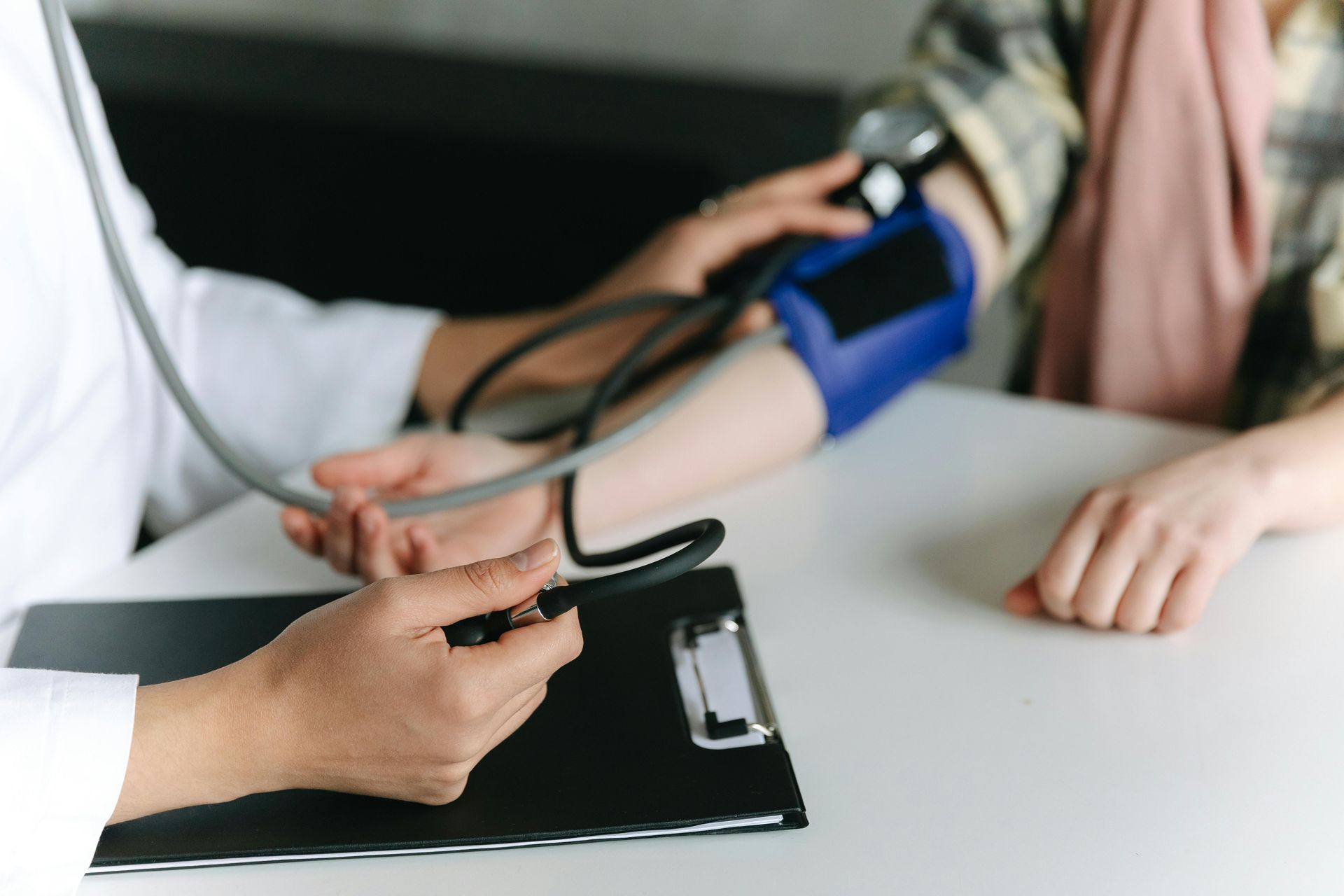Understanding Hair Loss: Causes and Prevention
High blood pressure, also known as hypertension, is a common condition affecting the body's arteries. It happens when there is a persistent elevation in the force of blood against the walls of the arteries. Blood pressure is measured in millimeters of mercury (mm Hg), and hypertension is typically defined as a blood pressure reading of 130/80 mm Hg or higher.
Sandeep Bastikar • July 6, 2025
Types of Hair Loss:
1. Genetic Hair Loss:
- Some individuals are genetically predisposed to hair thinning, resulting in gradual hair volume reduction. In these cases, specific hair follicles are sensitive to male hormones, causing them to shrink gradually and produce finer, shorter hairs with each hair growth cycle.
2. Reactive Hair Loss:
- Reactive hair loss occurs as a result of external factors. It is not dependent on genetic predisposition but can be triggered by internal imbalances such as nutritional deficiencies, severe stress, crash dieting, or illnesses.
Common Triggers of Hair Loss:
1. Hormonal Imbalance:
- Hormonal imbalances can affect various aspects of health and beauty, including hair. Hormones play a significant role in regulating the hair growth cycle. Estrogens keep hair in the growth phase for an optimal duration, while androgenic hormones can shorten this phase, potentially causing hair damage. Genetics can influence how hormones impact hair health.
2.Stress:
- Stress can elevate androgen levels, contributing to hair loss. It may also lead to scalp issues like dandruff and disrupt eating habits and the digestive system, all of which can negatively affect hair.
3. Iron Deficiency Anemia:
- Hair loss in women is often linked to iron deficiency as a prevalent factor. Iron is crucial for producing hair cell proteins, and its deficiency can lead to hair problems. Consult your doctor for advice and possible blood tests to address iron deficiency.
4.T hyroid Disorders:
- Thyroid imbalances can impact hair follicles, affecting hair growth. Untreated hypothyroidism can lead to anemia and exacerbate hair loss.
5. Vitamin B12 Deficiency:
- A lack of vitamin B12 can result in fatigue and low energy levels. It can also lead to hair loss as it affects red blood cell health, which is vital for oxygen transport to tissues. Vegans are particularly susceptible to B12 deficiency.
6. Rapid Weight Loss:
- Sudden weight loss, whether intentional or unintentional, can trigger excessive hair loss several weeks after the weight change. Hair is sensitive to dietary deficiencies and may show the effects of changes in the body.
7. Age:
- Hair loss often becomes more pronounced during and after menopause. As individuals age, their hair naturally becomes finer, which is a normal part of the aging process.
8. Traction Alopecia:
- Frequent and prolonged pulling on hair follicles, often caused by certain hairstyles like tight braids or dreadlocks, can result in traction alopecia. This type of hair loss occurs where the hair is under the most strain, typically around the edges.
Preventing Hair Loss:
To minimize the risk of hair loss, consider the following steps:
- Opt for loose hairstyles to reduce hair strain.
- Avoid excessive pulling, twisting, or rubbing of hair.
- Pat your hair dry gently with a towel rather than rubbing or twisting it.
- Maintain a balanced diet rich in iron and protein.
- Use caution when using styling products and tools, especially when hair is wet. Use lower heat settings when styling with heated tools.
- If hair loss is a concern, opt for a mild baby shampoo for washing hair. Consider reducing hair washing frequency, especially if your hair is naturally oily.
- Understanding the potential causes of hair loss and adopting preventive measures can help maintain healthy hair and address concerns associated with hair loss effectively.

Blood pressure is categorized into four general ranges: Normal blood pressure: 120/80 mm Hg. Elevated blood pressure: The upper number ranges from 120 to 129 mm Hg, with the lower number not exceeding 80 mm Hg. Phase 1 hypertension: The upper number ranges from 130 to 139 mm Hg, or the lower number is between 80 and 89 mm Hg. Phase 2 hypertension: The upper number is 140 mm Hg or higher, or the lower number is 90 mm Hg or more. A reading higher than 180/120 mm Hg is considered a hypertensive emergency. Untreated high blood pressure can lead to serious health problems such as heart attacks, strokes, and more. Regular blood pressure checks are crucial, starting at age 18 and repeated at least every two years. While most individuals with high blood pressure do not exhibit symptoms, some may experience headaches, shortness of breath, or nosebleeds. However, these symptoms are usually not specific and may only appear when hypertension reaches a severe stage. Blood pressure is influenced by the amount of blood the heart pumps and the resistance encountered by the blood as it flows through the arteries. Two main types of hypertension are: Primary hypertension: This type has no identifiable cause and tends to develop gradually over time. Factors like plaque buildup in the arteries (atherosclerosis) can contribute to its progression. Secondary hypertension: This form results from an underlying condition and manifests suddenly, leading to higher blood pressure than primary hypertension. Conditions and drugs that can trigger secondary hypertension include adrenal gland tumors, congenital heart defects, certain medications, illegal drugs, kidney disease, sleep apnea, and thyroid problems. Sometimes, a health check-up alone can cause a temporary rise in blood pressure, known as white coat hypertension. Prolonged high blood pressure can damage blood vessels and vital organs, resulting in complications such as heart attacks, strokes, aneurysms, heart failure, kidney problems, eye issues, metabolic syndrome, memory and cognitive i impairments, and even dementia. Taking steps to prevent and manage high blood pressure through a healthy lifestyle, regular exercise, and dietary changes can help mitigate the risk. In some cases, medication may be necessary to control hypertension effectively.

Enhancing Immunity: A Comprehensive Guide Optimize Your Gut Health Improving your immune system starts with enhancing your gut health. The gastrointestinal (GI) tract plays a pivotal role in our immune system. The intestinal lining produces antibodies and houses cells responsible for identifying and eliminating harmful bacteria. Balancing the good and bad bacteria in your gut is essential for optimal health. To promote good gut health, consider the following steps: Incorporate daily probiotics into your routine. Minimize the consumption of processed foods. If you have food sensitivities, contemplate removing items like gluten, dairy, and soy from your diet if they cause discomfort. Include Immunity-Boosting Foods Certain foods can significantly bolster your immune system: Mushrooms: A rich source of immune-boosting vitamin D, mushrooms can enhance white blood cell activity. Garlic: Allicin, a compound found in garlic, combats infection-causing microbes. Antioxidants: Consume a well-rounded diet consisting of unprocessed foods rich in antioxidants, such as leafy greens, mustard, and collard greens. Maintain Adequate Vitamin Levels Balanced vitamin levels are crucial for a robust immune system: Vitamin D: This vitamin is vital for immune health. Aim for daily doses of 2,000 IU to 5,000 IU. Vitamin C: Especially useful during periods of increased physical stress, vitamin C reduces the risk of common ailments like the cold. Daily intake should range from 1,000 mg to 5,000 mg, depending on your needs. Balance Hormones Maintaining balanced hormone levels, particularly estrogen and progesterone, is crucial to prevent autoimmune issues. Incorporate Herbs and Spices Include onions, garlic, ginger, black peppercorn, cayenne pepper, allspice, curry, and turmeric in your cooking. These ingredients contain components that can bolster your immune system. Stay Hydrated Proper hydration is one of the best ways to boost your immunity. Engage in Regular Exercise Cardiovascular exercises, such as running, jogging, and cycling, promote blood circulation and lymphatic fluid flow, r removing toxins and waste products. Aim for at least 30 to 40 minutes of cardio exercise five days a week. Manage Stress Mindfully Chronic stress can suppress the immune system. Manage stress through mindfulness techniques. Prioritize Adequate Sleep Getting seven to eight hours of sleep each night is crucial. Inadequate sleep can increase inflammation and weaken your ability to combat infections. Regularly Detoxify Regular detoxification is essential to alleviate the burden on your immune system. Incorporate detoxifying herbs like cilantro into your diet. Reduce Sugar Intake Limiting sugar consumption is vital, as it can cause inflammation, making your body more susceptible to illness. Limit Antibiotic Use Avoid antibiotics whenever possible, as they can disrupt beneficial gut bacteria and suppress immune functions. Explore natural alternatives first. Avoid Sharing Personal Items To minimize the risk of spreading germs, refrain from sharing personal items. Enjoy Life, Laugh, and Relax Chronic stress and depression can weaken the immune system, making us more susceptible to illness. Take time to savor life's pleasures. Start with Probiotics Incorporating probiotics into your diet can significantly enhance digestion and strengthen your immune system. Natural probiotic-rich foods like yogurt, kimchi, and miso are effective in promoting overall health. Prioritizing gut health is essential for a robust immune system.
